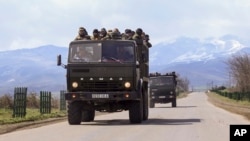The foreign ministers of Russia and Iran joined efforts on Thursday to prevent a new war between Azerbaijani and Armenian forces over Nagorno-Karabakh, while the sides in the conflict accused each other of violating a two-day-old cease-fire.
The Russian and Iranian foreign ministers were meeting with their Azerbaijani counterpart in Baku, and the Russian prime minister was due in the Armenian capital later in the day.
Fighting that erupted over the weekend has killed at least 64 people, including three civilians. It is the worst outbreak of violence since a separatist war ended in 1994 and left Nagorno-Karabakh - officially part of Azerbaijan - under the control of local Armenian forces and the Armenian military. Armenian forces also occupy several areas outside the Karabakh region.
The Azerbaijani Defense Ministry on Thursday said the Armenian side had violated the cease-fire 119 times over the past day and Azerbaijan's forces had returned fire. The ministry reported no fresh casualties.
Nagorno-Karabakh's military accused Azerbaijan of opening fire and reported that one of its soldiers had been killed in the shelling Wednesday night.
On Wednesday, each side said its troops were observing the cease-fire, which went into effect at midday Tuesday.
The fighting has raised fears of a possible escalation in hostilities, with Turkey strongly backing Azerbaijan and Russia obliged to protect Armenia by a mutual security pact. Russia, however, has supplied weapons to both countries, reflecting its desire to expand its influence in the strategic South Caucasus region, a conduit for energy resources from the Caspian Sea to the West.
For Iran, the Baku meeting is a chance to improve its sanction-stricken economic ties with neighboring countries. So far, Iran only has urged restraint by both sides in the Nagorno-Karabakh crisis, apparently because of a lack of influence on either Azerbaijan or Armenia.
Upon arrival in Baku, Iranian Foreign Minister Mohammad Javad Zarif told Iran's state news agency IRNA that he planned to discuss boosting cooperation with Azerbaijan and Russia, including the transit of goods.




